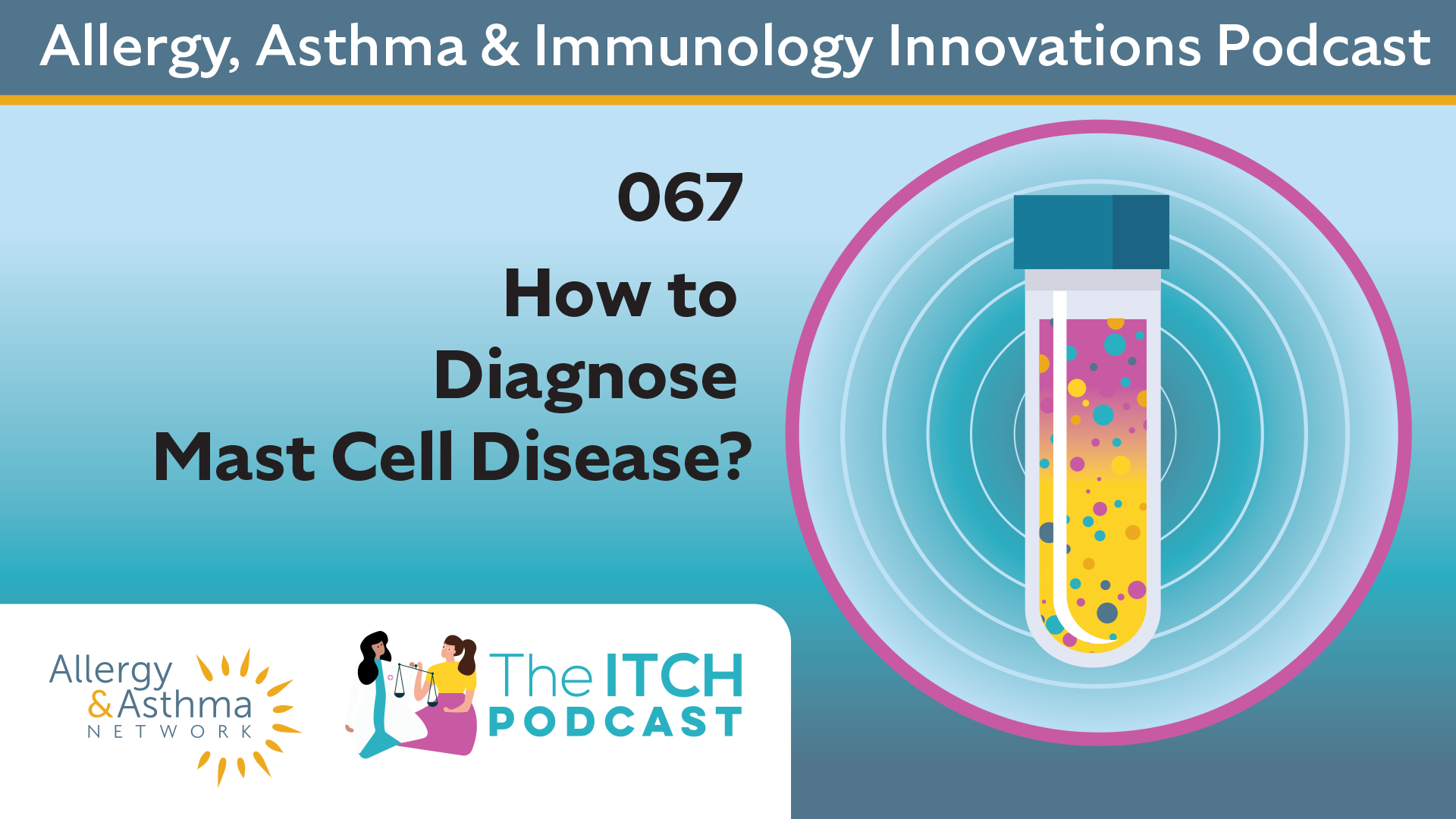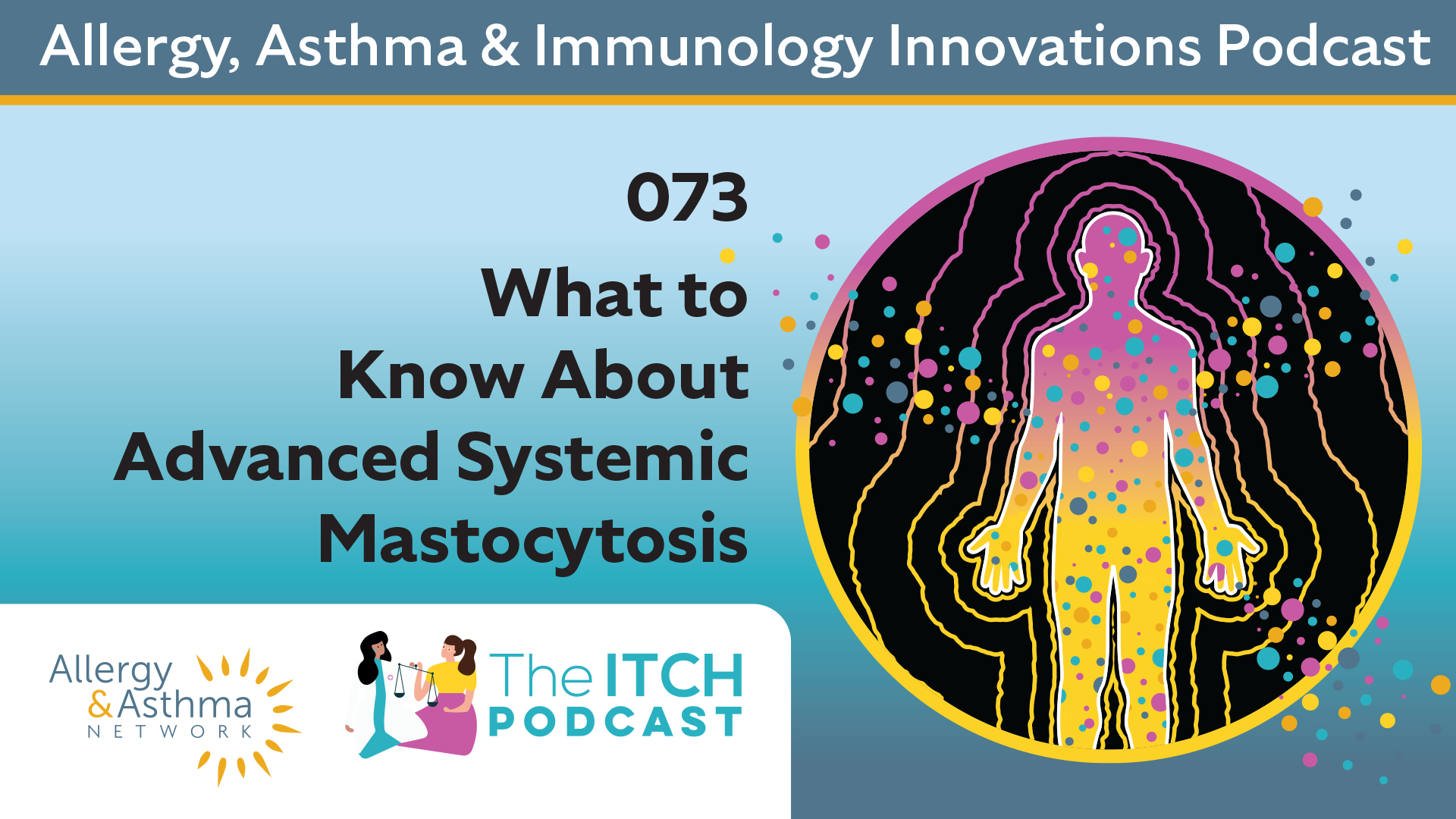Ep. 72: Mast Cell Disease, the Hematologist & New Treatments on the Horizon
Part of the series: Allergy, Asthma & Immunology Innovations Podcast
This podcast was made in partnership with Allergy & Asthma Network. We thank Blueprint Medicines for sponsoring this podcast.
LISTEN TO EPISODE 72:
iTunes • Spotify• Google • Amazon Music • YouTube
Why talk to a hematologist about mast cell disease and systemic mastocytosis treatment?
Dr. Douglas Tremblay, a leading hematologist, joins Dr. G and Kortney to discuss the role of a hematologist-oncologist in diagnosing and treating mastocytosis. We discuss bone marrow's vital role in diagnosing and treating systemic mastocytosis.
Dr. Tremblay discusses the latest KIT inhibitors, a promising group of medications, and explains the difference between indolent and advanced systemic mastocytosis. He clarifies how KIT inhibitors work and emphasizes the importance of managing side effects. Finally, Dr. Tremblay provides insights into the future of KIT inhibitor approval and explores the possibility of participating in a clinical trial for Bezulastinib.
What we cover in our about treating systemic mastocytosis:
What is a hematologist looking at with mast cell disease patients?
Mast cell diseases and the role of bone marrow
Bone marrow biopsy for systemic mastocytosis
What is a bone marrow biopsy?
Information bone marrow biopsy provides for diagnosis
KIT mutation
KIT mutation testing in bone marrow and blood (digital droplet PCR)
Indolent Mastocytosis versus Advanced Mastocytosis
Current research for treating mast cell disease
How KIT inhibitors work
Do KIT inhibitors weaken the immune system?
KIT Inhibitors discussed in this episode:
Avapritinib
Bezulastinib
Elenestinib
Are KIT inhibitors a cure for mast cell disease?
Determining the tolerance for side effects of medications when researching and adding new medicines for diseases
The meaning of ‘NIB’ in the medication names
The timeline for the new KIT inhibitors approval
The type of patient that can participate in the clinical trials for Bezulastinib
More in the Mast Cell Disease Series:
Resources about mast cell disease:
Dr. Tremblay: https://profiles.mountsinai.org/douglas-a-tremblay
Dr. Tremblay’s email: douglas.tremblay@mssm.edu
Mast Cell Disease Overview: https://allergyasthmanetwork.org/health-a-z/mast-cell-diseases/
What is Anaphylaxis? https://allergyasthmanetwork.org/anaphylaxis/
What is Epinephrine? https://allergyasthmanetwork.org/anaphylaxis/what-is-epinephrine/
The Mast Cell Disease Society: https://tmsforacure.org/
Current studies enrolling patients: https://tmsforacure.org/clinical-trials/
HARBOR: Study to Evaluate Efficacy and Safety of BLU-263 Versus Placebo in Patients With Indolent Systemic Mastocytosis https://clinicaltrials.gov/ct2/show/NCT04910685
AZURE: Study of Elenestinib (BLU-263) in Advanced Systemic Mastocytosis (AdvSM) and Other KIT Altered Hematologic Malignancies https://www.clinicaltrials.gov/ct2/show/NCT05609942
Cogent Biosciences; Two clinical trials to evaluate an investigational medication called Bezuclastinib (CGT9486) for people with Systemic Mastocytosis: www.mastocytosistrials.com/TMS
Systemic mastocytosis treatment: what is a KIT inhibitor?
In the case of mast cell diseases like systemic mastocytosis, targeted therapies known as KIT inhibitors have demonstrated potential in managing symptoms and enhancing the quality of life of individuals affected by the condition. Currently, KIT inhibitors are generally employed when other treatments have proven ineffective or the disease has progressed and requires more aggressive management.
How does a KIT Inhibitor work?
KIT protein: This protein is present on the surface of specific cells, including some types of mast cells. It plays a role in cell growth and survival. In systemic mastocytosis, the KIT protein has a mutation, which produces many mast cells.
KIT inhibitors: By inhibiting the function of KIT, these medications help to control the abnormal growth and activity of mast cells, thereby reducing symptoms and potentially slowing disease progression.
Examples of KIT inhibitors: Avapritinib, Bezuclastinib, and Elanestinib.
These medications are typically prescribed by a healthcare provider specializing in treating mast cell diseases, such as a hematologist or allergist-immunologist.
Only Avapritinib has FDA approval for indolent systemic mastocytosis.
Time Stamps
Ep. 72 What are the treatments available for systemic mastocytosis?
00:48 - Dr. Tremblay intro
01:49 - What is a hematologist looking at with mast cell disease patients?
02:38 - Mast cell diseases starting in the bone marrow
03:22 - What is clonal mast cell disease?
04:10 - Bone marrow biopsy for systemic mastocytosis
04:51 - What is a bone marrow biopsy?
07:22 - What information does a bone marrow biopsy provide a doctor
08:14 - KIT mutation
08:56 - What is bone marrow?
09:58 - KIT mutation testing (digital droplet PCR)
12:23 - Current research for treating mast cell disease
13:58 - KIT inhibitors: Avapritinib, Bezuclastinib, Elanestinib
17:36 - Indolent mastocytosis versus advanced mastocytosis
18:38 - How the KIT inhibitors work
20:07 - Tolerance for side effects of medications
21:31 - What 'NIB' mean in the medication name
22:53 - Are KIT inhibitors a cure for mast cell disease?
25:33 - Do KIT inhibitors weaken the immune system?
27:33 - What is the timeline for the new KIT inhibitor's approval
29:08 - What type of patient is eligible for clinical trials for Bezuclatinib








